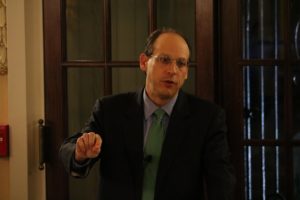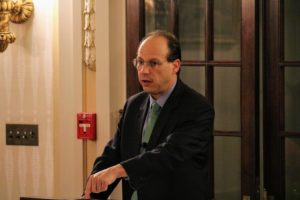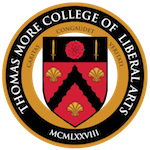 by Magdalena Dajka, ’20
by Magdalena Dajka, ’20
The Center for the Restoration of Christian Culture, an outreach of the Thomas More College of Liberal Arts, recently hosted a lecture by Dr. Ronald J. Pestritto, Dean of the Graduate School at Hillsdale College in Michigan. The topic of his talk, which was held at Mercy Hall, the College’s beaux arts mansion located in the heart of the historic district of Nashua, New Hampshire, was “Christianity and the Rise of American Progressivism.”
The purpose of the talk was to demonstrate “the connection between the rise of American progressivism and the principles of Social Gospel Christianity.” Dr. Pestritto began by explaining what Social Gospel Christianity is and where it came from. In the late nineteenth century, a great change took place in American higher education, when it came under the influence of the German educational model. At the time, German universities carried great prestige, so that intellectuals educated in Germany were highly sought after. As a result, American universities were influenced by German philosophy, particularly that of Hegel, who believed that the state is the divine idea as it exists on earth. According to this view, God is present in the state, and so complete devotion to the state is necessary.
Early American progressives applied this German model to theology, claiming that Christianity should be primarily concerned with this world, and that the kingdom of God can be implemented on this earth. This view required changing traditional Christian teachings. Christian religion had always had as its focus the doctrine of original sin and the fallen nature of man, whose end is in the next life. This focus was a problem for Christian progressives, because if the traditional teaching is true, paradise cannot be obtained in this life; the social order is incapable of perfection. Christian progressives thus turned to the theory of evolution for support, a theory which provides a prospect of man’s improvement and perfection in this world, not in another one. They applied these evolutionary ideas to politics, claiming that some version of paradise can be achieved through the social activity of the state.
 Another problem of the “old religion,” according to the progressives, was that it focused too much on the individual and on turning away from the world of men. This is an obstacle to giving oneself entirely to the social action of the state. According to the new theory, salvation comes from serving the social good; it is not found in any other, immaterial world.
Another problem of the “old religion,” according to the progressives, was that it focused too much on the individual and on turning away from the world of men. This is an obstacle to giving oneself entirely to the social action of the state. According to the new theory, salvation comes from serving the social good; it is not found in any other, immaterial world.
American government was founded on a much more sober view of man. In The Federalist Papers, Madison understood that man’s nature is flawed, and that it is folly to think of government as perfectible. Government reflects human nature, but human nature is limited. Therefore, government too must be limited. Only later in the history of America did progressive ideas start to gain favor, influenced by the teachings of Social Gospel Christianity. Since then, those ideas have largely lost their Christian character, though they continue to permeate contemporary politics.
Pestritto is the author of such works as American Progressivism (Lexington Books, 2008) and Woodrow Wilson and the Rise of Modern Liberalism (Rowman and Littlefield, 2005). Two Thomas More College alumna, Helena Fahey, ’18 and Sandra Kirby, ’18 are currently studying with Dr. Pestritto and others in Hillsdale College’s Van Andel Graduate School of Statesmanship. Dr. Pestritto’s talk left students, faculty and guests with much to consider about the roots of modern progressivism, and eager to return for future lectures sponsored by the College and the Center for the Restoration of Christian Culture.
